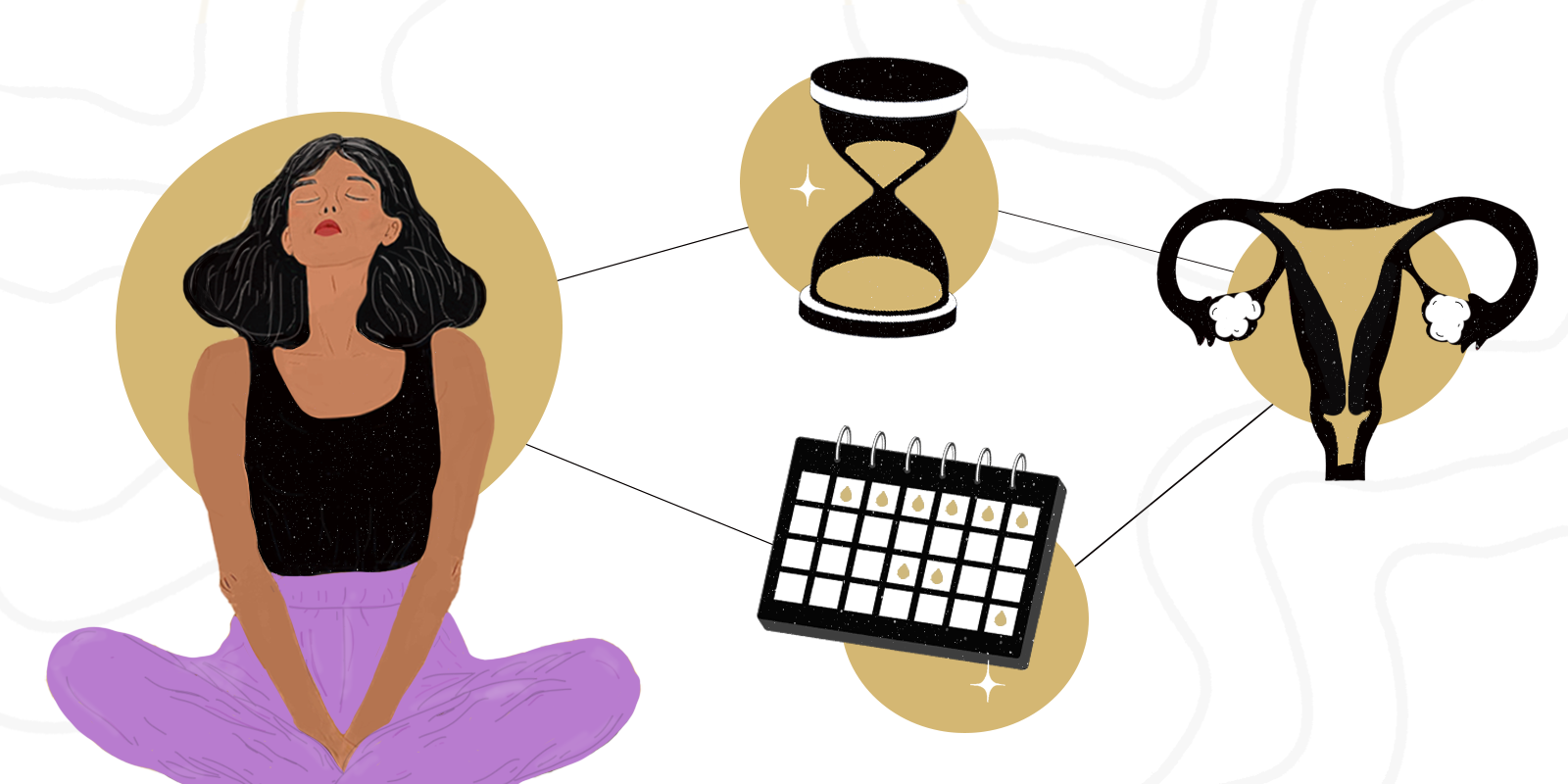-
What causes the onset of perimenopause?
The transition to perimenopause is marked by significant fluctuations, and ultimately, decreasing levels of estrogen, a hormone made in the ovaries. At the same time, levels of another hormone, progesterone, are starting to decline. Hormonal fluctuations are responsible for the unpredictable timing of cycles that are characteristic of perimenopause.
The decreasing quantity of follicles remaining lead to inefficient ovulation, meaning ovulation may become irregular.
The sharpest decline in estrogen comes during what Santoro calls the “late menopausal transition,” which starts when a woman has gone 60 days without a period and ends with menopause.
-
How do you know if you have entered the phase?
There is no way to pinpoint exactly when perimenopause begins.
“For women who have had regular cycles for their whole lives, the most common thing they’ll recognize is that they’ll skip a cycle,” Santoro said.
“But there's now been epidemiologic definitions that have looked at women who have recorded their menstrual cycles for years and show that a change in cycle length of seven days or more (for a few cycles) marks entry into the menopause transition. In the era of smartwatches that track your periods, that's something that a lot of women could tell us.”
Trying to diagnose menopause with blood tests that measure levels of follicle stimulating hormone (FSH) and estradiol (the main estrogen produced by the ovaries) is not routinely recommended. (For some women with breast cancer, however, knowing FSH levels can help when choosing a hormonal form of treatment.)
“I understand the drive to know, but labs are not typically helpful in making the diagnosis or effectively managing symptoms,” Liss said. “Knowing the timeline, symptoms and age is what's most valuable. Perimenopause, by definition, is an unpredictable hormonal time – I could be checking your hormones on a sky-high day or a low day or an in-between day. If you're miserable with hot flashes, knowing your hormone levels would not change how I approach treating your symptoms.”
-
How is menstrual bleeding affected?
Along with longer or shorter cycles, the amount of blood you lose during each period can be heavier or lighter than usual. You may also bleed for a longer or shorter amount of time.
In the late transition, as the time between cycles lengthens, periods tend to become heavier.
“During perimenopause, you're starting to have the gradual lessening of ovarian follicles and production of the reproductive hormones,” Liss said.
“The brain senses that and tries really hard to send signals to the ovary to pump out an egg every month. You get fairly erratic patterns, because the ovary can only work so well when so few follicles remain. So sometimes you get these accelerations of estrogen and then sometimes, you're just rapidly bottoming out and low,” she said.
“When you miss cycles or are not ovulating, the uterine lining can build up from increased estrogen exposure. In these cases, when you finally do have a period, it can be heavier.”
-
Can women still get pregnant?
Yes, you can. According to Liss, women over 40 represent one of the highest risk age groups for unintended pregnancy.
“While the odds of pregnancy are obviously different than for a 21-year-old, you are still able to get pregnant until your final period, because every period represents an egg that was ovulated,” Liss said.
“For somebody who was really diligent about tracking their cycle and fertile window, those metrics are just not as predictable anymore in perimenopause because of the cycle variations. A lot of women let their guard down because they aren't as fertile as they once were, but there is still fertile potential. So, it's really important that until you enter menopause, you take measures to prevent pregnancy if you are not intending to conceive.”
-
What is premature menopause?
The term “premature menopause” refers to menopause that occurs earlier than usual, before age 40. Risk factors for early menopause include a family history of premature menopause, exposure to certain medications like chemotherapy, smoking and some autoimmune diseases.
Menopause can also be brought on in women who undergo surgical removal of the ovaries – called a bilateral oophorectomy – which is sometimes done as part of a hysterectomy.
Surgical menopause is a much more abrupt process than naturally occurring menopause, as there is no perimenopausal phase.
“With surgical menopause, your ovaries are out, and your estrogen is gone in six hours,” Santoro said. “It’s a more severe, shocking kind of transition. With a natural transition, hormones bounce up and down, and that causes symptoms. “It’s pretty annoying when you're going through it, but it may help your body accommodate and step down and adapt to it.”
-
How can perimenopause affect quality of life?
Classic symptoms of perimenopause include hot flashes, mood changes and disrupted sleep. Some women also experience vaginal dryness, urinary tract problems, cognitive difficulties and a lower libido.
Women going through perimenopause are often at the peak of their careers, with families, and may be taking care of aging parents as well. In some cases, symptoms can take a toll on their relationships and their ability to perform professionally.
“When someone's not sleeping because of hot flashes and their sleep is disturbed and then they're fatigued and then they're irritable, it is a pretty vicious spiral,” Liss said. “It can affect daytime functioning, relationships and cognitive capacity. So, it becomes a pretty interconnected and complex web quickly.”
Fortunately, there are a lot of safe and effective evidence-based therapies available to treat even the most severe symptoms. Lifestyle changes can be helpful as well.
-
When is it time to call your doctor?
Persistent heavier-than-usual bleeding is not normal during perimenopause. Losing too much blood can cause you to become anemic. “If you’re saturating a pad or a tampon in one hour for more than two hours, that is considered excessive blood loss,” Liss said. “Any signs of weakness, palpitations or dizziness are also indications.”
Untreated hot flashes can also lead to other health problems. “Hot flashes are more than just the experience of the hot flash,” Liss said. “There's some preliminary links to overall cardiovascular health, mood and depression. I see vasomotor symptoms not only as symptoms but also as an indicator of larger health consequences.”
Liss stressed, however, that perimenopause is not terrible for everyone. “Some people have a very uneventful transition. It’s not necessarily something to be dreaded, but it also should not be endured if someone is suffering. I would say if your day-to-day life is impacted, you should be seeing an OB/GYN (preferably, who specializes in menopause) and get a workup and treatment.
“The transition tends to be the hardest part in the eye of the storm, but post menopause things really stabilize, and women can feel really well. A lot of women feel like it's their best chapter yet.”
Guest Contributor: Christina Frank is a Brooklyn-based writer who specializes in health and medicine.





